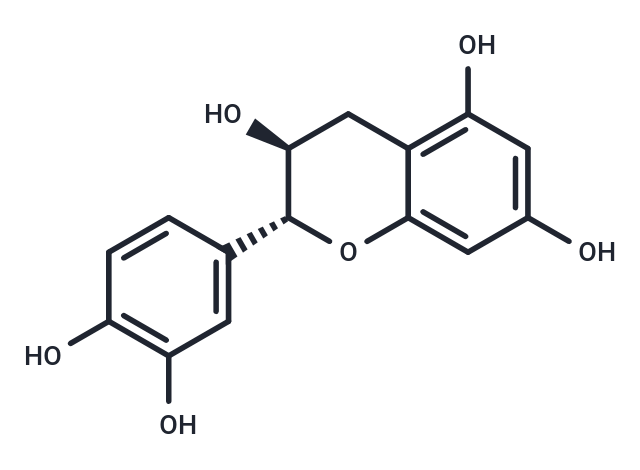Shopping Cart
- Remove All
 Your shopping cart is currently empty
Your shopping cart is currently empty

Catechin (Cianidanol) is a flavan-3-ol, a type of natural phenol and antioxidant.

| Pack Size | Price | Availability | Quantity |
|---|---|---|---|
| 25 mg | $30 | In Stock | |
| 50 mg | $37 | In Stock | |
| 100 mg | $50 | In Stock | |
| 500 mg | $127 | In Stock | |
| 1 g | $187 | In Stock | |
| 1 mL x 10 mM (in DMSO) | $39 | In Stock |
| Description | Catechin (Cianidanol) is a flavan-3-ol, a type of natural phenol and antioxidant. |
| Targets&IC50 | COX-2:130 μM, COX-1:80 μM |
| In vitro | The catechin flavonoid reduces proliferation and induces apoptosis of murine lymphoma cells LB02 through modulation of antiapoptotic proteins[1]. Treatment of human prostate cancer cells with catechin induces apoptosis and results in effects on a variety of survival signals suggesting the potential of these compounds as chemopreventive agents for prostate cancer[2]. Catechin is well known to inhibit cyclooxygenase activity with reported IC50 values ranging from 4O μM to 943 μM. It has also been reported to act as an inhibitor of COX-1 and COX-2 with IC50 of about 80 μM and 130 μM[3]. |
| In vivo | Dietary catechin significantly delayed tumor onset[5]. Continued intake of catechin, a potential antioxidant, prevents memory regression and DNA oxidative damage in senescence-accelerated (SAMP10) mice. It does not prolong the lifetime of SAMP10 mice, but it does delay brain senescence[6]. (+)-Catechin inhibits intestinal tumor formation and suppresses Focal adhesion kinase activation in the Min/+ Mouse[7]. |
| Cell Research | LB02 cells were resuspended in RPMI 10% FBS in a concentration of 5x105 cells/mL. The cultures were performed in 96-well round-bottomed microtitre plates in presence of different concentrations of catechin or rutin (10, 50, 100 or 200 μg/mL). After 48 h at 37 ºC in a humidified atmosphere with 5% CO2 in the air, cultures were pulsed with 1 μCi of 3H-thymidine/well and maintained for an additional 18 h period prior to a semiautomatic method harvest. (Only for Reference) |
| Alias | D-Catechin, Cianidanol, Catechuic acid, Catechinic acid, (+)-Catechin |
| Molecular Weight | 290.27 |
| Formula | C15H14O6 |
| Cas No. | 154-23-4 |
| Smiles | O[C@@H]1[C@H](OC=2C(C1)=C(O)C=C(O)C2)C3=CC(O)=C(O)C=C3 |
| Relative Density. | 1.593 g/cm3 |
| Storage | keep away from direct sunlight | Powder: -20°C for 3 years | In solvent: -80°C for 1 year | Shipping with blue ice. | ||||||||||||||||||||||||||||||||||||||||
| Solubility Information | DMSO: 50 mg/mL (172.25 mM), Sonication is recommended. H2O: 25 mg/mL (86.13 mM ), Sonication is recommended. Ethanol: 54 mg/mL (186.03 mM), Sonication is recommended. | ||||||||||||||||||||||||||||||||||||||||
Solution Preparation Table | |||||||||||||||||||||||||||||||||||||||||
H2O/DMSO/Ethanol
DMSO/Ethanol
| |||||||||||||||||||||||||||||||||||||||||

Copyright © 2015-2025 TargetMol Chemicals Inc. All Rights Reserved.